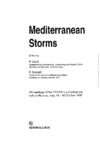Identificador persistente para citar o vincular este elemento:
https://accedacris.ulpgc.es/jspui/handle/10553/77035
| Campo DC | Valor | idioma |
|---|---|---|
| dc.contributor.author | Cana, L. | en_US |
| dc.contributor.author | Hernández, E. | en_US |
| dc.contributor.author | García, R. | en_US |
| dc.contributor.author | Grisolía-Santos, D. | en_US |
| dc.date.accessioned | 2021-01-07T13:49:06Z | - |
| dc.date.available | 2021-01-07T13:49:06Z | - |
| dc.date.issued | 1999 | en_US |
| dc.identifier.isbn | 88-7740-296-2 | en_US |
| dc.identifier.uri | https://accedacris.ulpgc.es/handle/10553/77035 | - |
| dc.description.abstract | Mesoscale Convective Systems (MCSs) data registers from June to December during 1990-94 were obtained from the Spanish Nacional Meteorological lnstitute (INM). Sixty seven Mesoscale Convective Systems (MCSs) and fifteen Mesoscale Convective Complexes (MCCs) were identitied through this database. Most of the MCCs and MCSs developed during the last week of Septernber. The dominant synoptic patterns related to the mesoscale systems were cold fronts at the surface with warm and moist low-level cores, and cut-off low or deep trough throughout the middle and upper levels. These synoptic patterns were found in all the cases studied. The hourly centroid location of the MCC was used to trace their tracks, which followed a general direction towards the E or NE in almost ali cases. These trajectories are clearly related to the synoptic patterns found. Finally, a Skew T- Log p thermodinamic diagram from the nearest sounding station to a developing MCC is shown. | en_US |
| dc.language | eng | en_US |
| dc.publisher | Bios | en_US |
| dc.source | Mediterranean Storms: proceedings of the EGS Plinius Conference held at Maratea, Italy, 1999, p.67-75 | en_US |
| dc.subject | 2502 Climatología | en_US |
| dc.title | Mesoscale convective systems during 1990-94 : characteristics and synoptic environment | en_US |
| dc.type | info:eu-repo/semantics/conferenceobject | en_US |
| dc.type | ConferenceObject | en_US |
| dc.relation.conference | EGS Plinius Conference | en_US |
| dc.description.lastpage | 75 | en_US |
| dc.description.firstpage | 67 | en_US |
| dc.investigacion | Ciencias | en_US |
| dc.type2 | Actas de congresos | en_US |
| dc.description.numberofpages | 9 | en_US |
| dc.identifier.ulpgc | Sí | en_US |
| dc.contributor.buulpgc | BU-BAS | en_US |
| item.fulltext | Con texto completo | - |
| item.grantfulltext | open | - |
| crisitem.author.dept | GIR IOCAG: Oceanografía Física | - |
| crisitem.author.dept | IU de Oceanografía y Cambio Global | - |
| crisitem.author.dept | Departamento de Física | - |
| crisitem.author.dept | GIR IOCAG: Oceanografía Física | - |
| crisitem.author.dept | IU de Oceanografía y Cambio Global | - |
| crisitem.author.dept | Departamento de Física | - |
| crisitem.author.orcid | 0000-0001-6006-5488 | - |
| crisitem.author.orcid | 0000-0003-2566-069X | - |
| crisitem.author.parentorg | IU de Oceanografía y Cambio Global | - |
| crisitem.author.parentorg | IU de Oceanografía y Cambio Global | - |
| crisitem.author.fullName | Cana Cascallar, Luis Cesáreo | - |
| crisitem.author.fullName | Grisolía Santos, Diana | - |
| Colección: | Actas de congresos | |
Visitas
45
actualizado el 10-ene-2026
Descargas
11
actualizado el 10-ene-2026
Google ScholarTM
Verifica
Altmetric
Comparte
Exporta metadatos
Los elementos en ULPGC accedaCRIS están protegidos por derechos de autor con todos los derechos reservados, a menos que se indique lo contrario.
